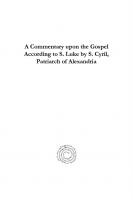A Commentary Upon the Gospel According to S. Luke by S. Cyria Commentary Upon the Gospel According to S. Luke by S. Cyria Commentary Upon the Gospel 9781593338220, 1593338228
As the title of this work broadly indicates, it is the translation into English of St. Cyril of Alexandria's commen
247 94 29MB
English Pages 390 [387] Year 2009
Preface
Commentary of S. Cyril, Patriarch of Alexandria, upon the Gospel of St. Luke. Chapter I
Chapter II
Chapter III
Chapter IV
Chapter V
Chapter VI
Recommend Papers

- Author / Uploaded
- Robert Payne Smith
File loading please wait...
Citation preview
A Commentary upon the Gospel According to S. Luke by S. Cyril, Patriarch of Alexandria
A Commentary upon the Gospel According to S. Luke by S. Cyril, Patriarch of Alexandria
First Translated into English from an Ancient Syriac Version
Parti
Robert Payne Smith
1 gorgias press 2009
Gorgias Press LLC, 180 Centennial Ave., Piscataway, NJ, 08854, USA www.gorgiaspress.com Copyright © 2009 by Gorgias Press LLC
All rights reserved under International and Pan-American Copyright Conventions. No part of this publication may be reproduced, stored in a retrieval system or transmitted in any form or by any means, electronic, mechanical, photocopying, recording, scanning or otherwise without the prior written permission of Gorgias Press LLC. 2009
-X.
% ISBN 978-1-59333-822-0
Printed in the United States of America
P ft
E F A C E .
w H E N I undertook the task of preparing for the press the Syriac Version of S. Cyril's Commentary upon the Gospel of S. Luke, discovered among the manuscripts lately obtained from Egypt, and deposited in the British Museum, I was aware that my labours would be of little practical benefit, unless I also made it accessible to theologians generally by means of an English translation. In the performance of this duty, my chief assistance has been derived from the Nova Bibliotheca Patrum of Cardinal Mai, published in 1844-58 at R o m e : for so miserably defective is even the best Syriac Lexicon, that it has repeatedly happened that I have only been able to arrive with something like certainty at the meaning of a passage, by waiting until I found in some extract in Mai the equivalent in Greek of the word or phrase in question. Wherever this help has failed, I have carefully examined the use of words in other Semitic dialects, or in the numerous Syriac works which during the last few years have issued from the press, and in which I had been in the habit of noting the occurrence of ail new and unusual terms. To A 2
iv
PREFACE.
have discussed these difficulties in notes, would have been only to crowd my pages with matter not generally interesting, and for which, I trust, I shall hereafter have a more fitting opportunity. I think, however, that I can safely say, that in no case have I come to a conclusion except upon reasonable grounds, and that, after due allowance made for possible errors, my translation will be found to convey a correct and adequate representation of the original work. Of the value of the Commentary, I shall probably not be considered an impartial judge: still my conviction is, that it can scarcely fail of being regarded as an important addition to our means of forming an accurate judgment of what was the real teaching of one of the most famous schools of thought in the early Church. It has not indeed gained entire acceptance; its philosophy was too deep, its creed too mysterious, its longings too fervently fixed upon the supernatural, for the practical mind of the West readily to assent to doctrines which mock rather than exercise the powers of even the subtlest reason. And while the names of its doctors have become household words with us, and we owe to their labours the establishment of the doctrine of the Trinity in Unity in its main outlines as we hold it at present, still the student of Church History is aware, that in many minor, though still important particulars, the teaching of the Alexandrine school was in excess of what we at present hold. The Athanasian Creed does not embody the actual tenets of Athanasius, nor of the other great masters of Alexandria, except in the form in which they were modified and altered by the influence of rival schools: and
PREFACE.
v
in like manner S. Cyril, the inheritor at once of Athanasius' throne, and of his views, often uses arguments which the Monophysites could fairly claim as giving a colour to their belief, that after the union of the two natures in Christ it was no longer lawful to distinguish their separate limits. It was the Nestorian controversy which called out the argumentative powers and the fiery zeal of S. Cyril ; and it is certainly true that in that controversy he used Nestorius unfairly, taxing him with deductions, which, however logically they might seem to follow from his opponent's teaching, yet Nestorius himself expressly denied : but it is not true that the controversy led him into statements of doctrine beyond what his predecessors in the see of Alexandria had taught. For constantly what he opposed to his rival's views was the very doctrine of S. Athanasius ; and the passage which lie quotes in his treatise De recta Fide, ad Impératrices, from that father's treatise on the Incarnation of Christ, is never exceeded in any of his own dogmatic statements. Its words are as follow : — o/mokoyov/uiev, KCU eîvat avrov vlov rod OeoS Kal
6eov
Xoyou
r>J? a-apKOS avrcv
filav
ov
two
¿7rpocr-
cre





![Commentary of Saint Ambrose on the Gospel According to Saint Luke [1.0]
9781902232263](https://ebin.pub/img/200x200/commentary-of-saint-ambrose-on-the-gospel-according-to-saint-luke-10-9781902232263.jpg)
![The Gospel According to Luke X-XXIV [28A]
0385155425](https://ebin.pub/img/200x200/the-gospel-according-to-luke-x-xxiv-28a-0385155425.jpg)

![The Gospel According to Luke I-IX [28]
0385005156](https://ebin.pub/img/200x200/the-gospel-according-to-luke-i-ix-28-0385005156.jpg)
